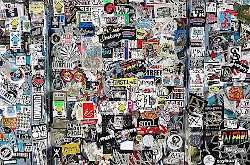속어

Slang/ is a popular, less official and often very current form/ of language. It is an important part/ of a living language/ and is constantly changing/ as language/ changes. Slang/ is often playful, direct and sometimes less respectful/ than the more official and traditional version/ of language. So now/ I'm going to lay it on you! To “lay it on”/ is American slang/ for “to tell”/ or “to explain.”
Slang/ can take many forms. For example, slang/ can be local/ to one city/ or area. In Washington, D.C./ there is a whole set of slang/ to describe politics and business/ in the city. For example, the term POTUS/ stands for President of the United States. POTUS/ can often be found/ with his wife, FLOTUS, the first lady/ of the United States.
“Inside the Beltway”/ is a popular expression/ that describes the area of Washington, D.C. The beltway/ is the large highway/ that circles the city.
The Internet/ has helped create a whole new kind of computer-related slang. An “angry fruit salad”/ is an expression/ that describes a Web site/ with too many bright colors. “Netiquette”/ is slang/ for correct behavior/ when using the Internet.
Young people/ often develop the latest slang. For example, to say Special English “rocks” or is “phat”/ means/ Special English/ is really great. A “kegger”/ is a party/ where beer/ is served. If something/ is “wack”/ it is wild and crazy.
Different professions/ often have their own slang/ as well. For example, medical workers/ might refer to a complaining patient/ as a “gomer." A “tough stick”/ is someone/ whose veins/ are difficult to find/ when he or she/ needs to have blood taken.
No matter how well/ you speak English, there are always new and interesting slang words/ to discover. There are entire dictionaries/ for describing slang.
Many experts/ do not even agree/ on what is and what is not slang. Often/ slang words/ later become a part/ of officially accepted language. Official or not, slang/ is an energetic and exciting part/ of the American language/ that continues to change.

